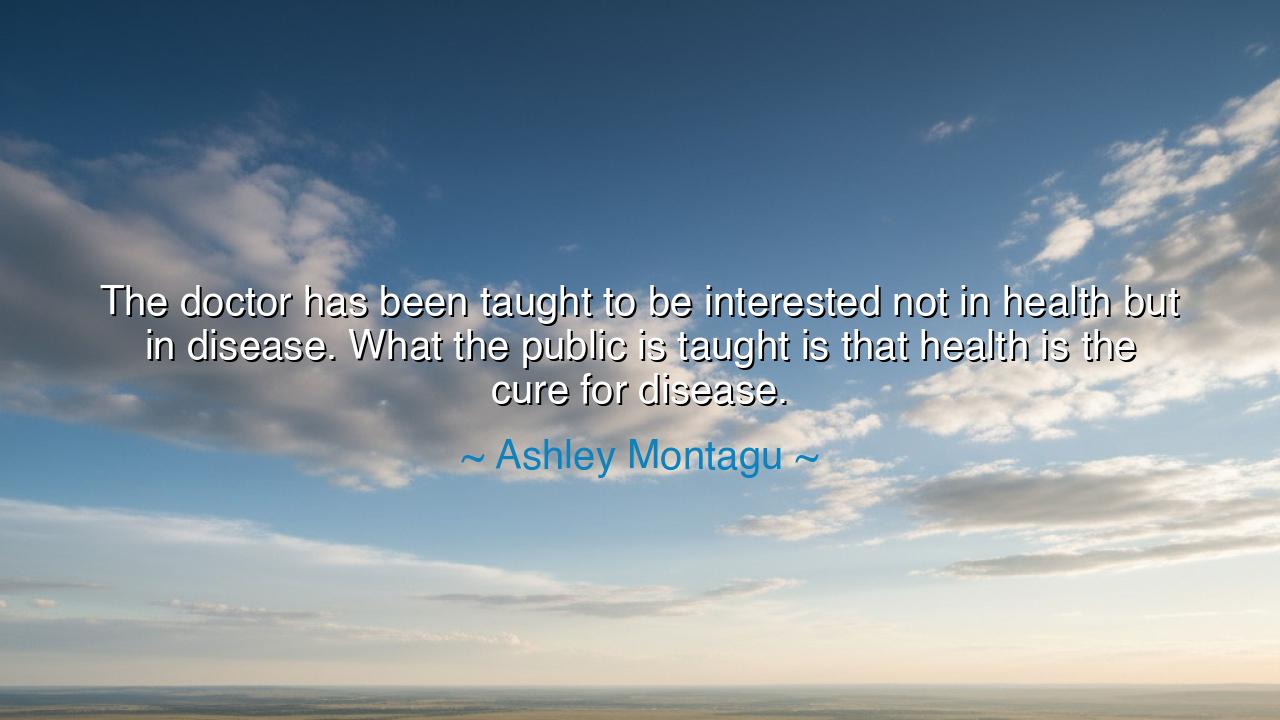
The doctor has been taught to be interested not in health but in
The doctor has been taught to be interested not in health but in disease. What the public is taught is that health is the cure for disease.






When Ashley Montagu declared, “The doctor has been taught to be interested not in health but in disease. What the public is taught is that health is the cure for disease,” he was not merely criticizing the practice of medicine—he was unveiling a deep flaw in the very way humanity understands life, balance, and healing. His words cut through centuries of habit, reminding us that the art of medicine has too often turned its gaze toward illness rather than wellness, toward symptom rather than source. Montagu, a biological anthropologist and philosopher of human potential, sought to restore to medicine its ancient sacredness: the cultivation of wholeness, not merely the eradication of sickness.
In these lines, he reveals a paradox: the doctor, trained to fight disease, may lose sight of health itself, and the public, conditioned to fear illness, comes to believe that health is simply the absence of pain. But true health, Montagu suggests, is not the absence of something—it is the presence of harmony. It is the alignment of body, mind, and spirit, a symphony of forces working in rhythm with nature. To live in health is to live in awareness, to care for the soil before weeds appear, to tend the flame before it flickers. Yet our civilization, in its haste and its commerce, has built temples not to wellness, but to cure.
Long ago, the ancients knew better. In the temples of Asclepius, the Greek god of healing, patients came not merely to be treated, but to be transformed. They fasted, meditated, dreamed, and prayed, seeking balance between the physical and the divine. The healer was not a warrior battling disease, but a guide leading souls back to equilibrium. The focus was not on what was wrong, but on what could be made right. Montagu’s lament is that this wisdom has been forgotten—that modern medicine, born from noble curiosity, has been lured away by specialization, machinery, and profit. The doctor studies the pathology of the sick, but rarely the poetry of the well.
Consider the story of Florence Nightingale, who revolutionized medicine not through new drugs or procedures, but through attention to cleanliness, light, rest, and the human spirit. She understood that recovery was not simply about removing disease, but about restoring the conditions in which life flourishes. Her wards became sanctuaries of order and peace. Mortality fell, not because she fought sickness directly, but because she created the soil in which health could grow. Hers was medicine as Montagu envisioned it—proactive, nurturing, and whole.
Montagu’s words also strike at the heart of society’s misunderstanding. The public, taught to equate health with cure, seeks medicine only in crisis, not in daily care. We wait until the body cries out before we listen, until imbalance becomes suffering before we act. In doing so, we betray the wisdom of nature itself, which sustains health not by fighting, but by maintaining balance—the same balance found in the turning of the seasons, in the rhythm of breath and heartbeat. True medicine should mirror this rhythm, teaching prevention, mindfulness, and moderation rather than depending upon intervention after the fall.
Yet this is not merely a criticism—it is an invitation. Montagu’s insight calls upon healers and laypeople alike to remember that health is an art of living. It demands patience, self-knowledge, and harmony with the world around us. The doctor’s true task is not only to mend bodies, but to teach the wisdom of wholeness—to remind humanity that the cure lies not in the pill, but in the pattern of our days: the food we eat, the thoughts we nurture, the relationships we cultivate, and the peace we carry within.
There is, then, a quiet heroism in those who live this way—the mother who insists on rest and nourishment before sickness sets in, the physician who speaks of balance rather than prescriptions, the teacher who reminds students that the mind, too, must be tended like a garden. These are the keepers of the ancient flame of healing, those who remember that to preserve health is nobler than to restore it after loss. They are heirs to the truth that wellness is not medicine’s byproduct—it is its highest calling.
Final Lesson: True medicine is not the fight against disease, but the cultivation of harmony. Health is not a cure—it is a condition of balance, born from conscious living.
Practical Actions: Seek wellness each day before illness arises. Live in tune with nature’s rhythms—sleep deeply, eat mindfully, breathe slowly. View your physician not as a mechanic, but as a guide on the path to wholeness. And remember: to guard your health is to honor the miracle of life itself. For as Montagu reminds us, the goal of medicine is not merely to treat the broken—but to keep the whole unbroken.






AAdministratorAdministrator
Welcome, honored guests. Please leave a comment, we will respond soon